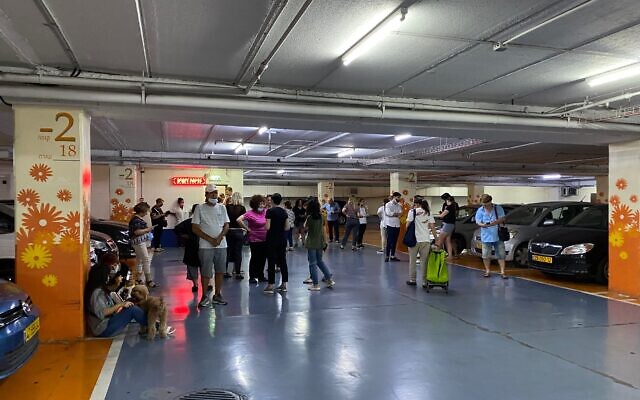Tel Aviv’s central Ibn Gabirol street was unusually quiet on Thursday afternoon — cars and buses were still zooming by, as were a few people on electric scooters, but traffic was far lighter than usual. Coffee shops and restaurants, which only just reopened after months of COVID-imposed shutdowns, were once again almost devoid of customers. Rabin Square, until recently the home of huge COVID testing and vaccination sites, was sun-drenched but empty.
Israel’s latest round of combat with the Gaza Strip this week has seen repeated barrages of rockets target the coastline city. Israel’s cultural hub, located some 70 kilometers from Gaza, is usually insulated from the intermittent outbreaks of violence between the Strip and Israel.
Though terror groups have had the capability of reaching the central city with their rockets for years now, they normally avoid doing so, aware that the Israeli response will be severe. Consequently, while southern towns and cities like Sderot, Ashkelon and Ashdod are somewhat accustomed to suffering the threat of airborne attacks from time to time, Tel Aviv last heard rocket sirens during the summer war of 2014.
“We are used to living in a bubble here in Tel Aviv,” said Annette, an immigrant from Germany who has lived in Tel Aviv since the 80s, and who has witnessed a number of Israeli wars. “My first was the First Lebanon War in the early 80s.”

Tel Aviv’s Ibn Gabirol Street and Rabin Square, May 13, 2021 (Shoshanna Solomon/Times of Israel)
Annette was sitting at a coffee shop on Rabin Square with her partner, sipping a cappuccino and splitting a sandwich. They live close by, she said, and came out “for some sanity” and to get a break from the constant barrage of bad news.
In total, Palestinian terrorists have fired nearly 1,500 projectiles from Gaza toward Israel since the outbreak of fighting on Monday evening, with roughly a fifth landing inside Gaza, the Israeli military has said. In response, the Israel Defense Forces has attacked Hamas targets, destroying key facilities belonging to the terror group and hitting top commanders. Meanwhile, unrest has gripped several Israeli cities, mostly those with Jewish and Arab populations, where rioting by extremists from both ethnicities has seen people injured and property vandalized. Tel Aviv has so far been largely exempt from such violence (though Jaffa has seen some unrest).

The open-air Gan Ha’ir mall almost devoid of customers, May 13, 2021 (Shoshanna Solomon/Times of Israel)
“Yesterday evening from around 5 p.m. Tel Aviv was so quiet it felt like just before Shabbat,” Annette said. Around that time, residents were bracing for a fresh barrage after the IDF killed several Hamas field commanders in Gaza.
“Actually no. Not Shabbat. More like ahead of Yom Kippur,” she corrected, referring to the Jewish day of atonement, marked in the autumn, when businesses and traffic shut down and many Israelis, even secular ones, maintain a day of fasting.
“It is as if they folded up the pavements so people cannot walk,” she said, adding, “In Israel there are always ups and downs. This too shall pass.”
At the nearby open-air Gan Ha’ir mall, Mickey, a store manager for a women’s fashion chain, said that after two months of brisk business as lockdowns lifted and the virus waned, customer traffic had significantly slowed down. “I managed to clean my house and do a few chores this morning before leaving for work, because I knew that there would be no traffic,” she said.

Mickey, a mall store manager, says that after two months of brisk business, stores are empty once again, May 13, 2021 (Shoshanna Solomon/Times of Israel)
As one customer came to pick up a dress she’d ordered, Mickey said: “It’s good you bought yourself something nice. See? You never know what the future holds. You’ve just got to live.”
Soon afterward, sirens sounded once more, warning of incoming missiles. A mother exited a nearby store, grabbing her daughter by the arm. Both ran toward stairs leading to the mall’s underground parking, as other shoppers followed.
There was no panic as people gathered in the underground space. Many checked out news updates on their phones, or called up family members to reassure them that they were okay. Upbeat mall music continued to pipe out from nearby speakers, muffling the sounds of two or three explosions overhead — possibly the Iron Dome defense system intercepting the rockets.

The underground parking lot at Tel Aviv’s Gan Ha’ir parking lot as visitors wait for rocket barrage to pass, May 13, 2021 (Shoshanna Solomon/Times of Israel)
After about 10 minutes some of those assembled in the parking lot made their way back up to the mall. Others, including this reporter, got into their cars and made their way to homes or offices — life, as always, going on.
Several dozen rockets had been fired at Tel Aviv and Beersheba, it later became clear, with at least four people injured.
Related posts:
Views: 0
 RSS Feed
RSS Feed

















 May 14th, 2021
May 14th, 2021  FAKE NEWS for the Zionist agenda
FAKE NEWS for the Zionist agenda  Posted in
Posted in  Tags:
Tags: 
















